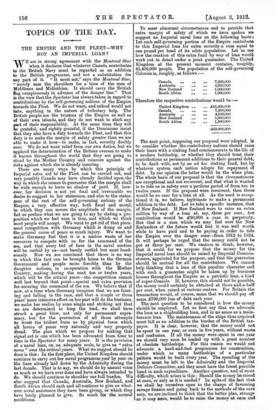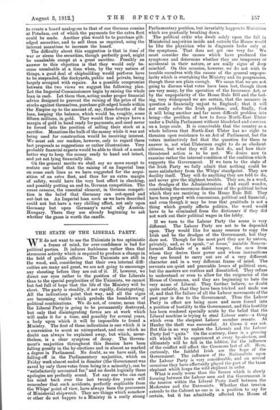TOPICS OF THE DAY.
THE EMPIRE AND THE FLEET—WHY NOT AN IMPERIAL LOAN ?
WE are in strong agreement with the Montreal Star when it declares that whatever Canada contributes to the British Navy must be regarded as an addition to the British programme, and not a substitution for any part of it. " It must not," says the Montreal Star, " merely ease the shoulders for a time of the men of Middlesex and Midlothian. It should carry the British flag conspicuously in advance of the danger line." That is the view that the Spectator has always taken in regard to contributions by the self-governing nations of the Empire towards the Fleet. We do not want, and indeed would not take, anything in the nature of tributary help. The British people are the trustees of the Empire as well as of their own islands, and they do not want to shirk any part of their responsibility. At the same time they will be grateful, and rightly grateful, if the Dominions insist that they also have a duty towards the Fleet, and that this duty is to make the margin of safety greater than we are able to make it here—to make, in fact, security doubly sure. We do not want relief from our own duties, but we applaud the determination of the Britons oversea to make it known throughout the world that they are going to stand by the Mother Country and reinsure against the risks against which she is already insuring.
There are many ways by which this principle of Imperial extra aid to' the Fleet can be carried out, and very possibly Canada may have already decided upon the way in which she means to guarantee that the margin shall be wide enough to leave no shadow of peril. If, how- ever, her decision is not yet final and irrevocable we desire to suggest to her statesmen, and also to the states- men of the rest of the self-governing nations of the Empire, a very effective way, both fiscal and moral, in which they can secure the amplitude of the margin. Let us preface what we are going to say by stating a pro- position which we feel sure is true, and which we think most people will accept. We want to get rid of that piece- meal competition with Germany which is doing us and the general cause of peace so much injury. We want to make Germany feel that it is a useless waste of her resources to compete with us for the command of the sea, and that every bid of hers in the naval auction will be outbid by us—not barely outbid but most hand- somely. Now we are convinced that there is no way in which this fact can be brought home to the German Government and people more forcibly than by the daughter nations, in co-operation with the Mother Country, making during the next ten or twelve years, which will be the critical years—the competition cannot well last beyond that point—special and extra provision for securing the command of the sea. We believe that if now, at a time when Germany imagines that we are faint- ing and falling in the race, and that a couple or three years' more intensive effort on her part will do the business, we make her realize by some single and striking act that we are determined to keep the lead, we shall have struck a great blow, not only for permanent supre- macy, but for the prevention of all those attempts to wrest the trident from us by physical force which all lovers of peace very naturally and very properly dread. The plan which we propose for making that signal act is one which has been advocated from time to time in the Spectator for many years. It is the provision of a naval loan, on an adequate scale, to give us " extra cover" over the critical years. What we suggest should be done is this : In the first place, the United Kingdom should continue to carry out her naval programme year by year on the lines already laid down by the Admiralty during the last decade. That is to say, we should do by annual votes as much as we have ever done and have always intended to do. We should continue to shoulder our full burden. We also suggest that Canada, Australia, New Zealand, and South Africa should each and all continue to give us what- ever naval assistance they have been giving, or which they have lately planned to give. So much for the normal conditions. To meet abnormal circumstances and to provide that extra margin of safety of which we 'nave spoken we suggest an Imperial naval loan on the following basis Let each self-governing portion of the Empire contribute to this Imperial loan for extra security a sum equal to one pound per head of its white population. Let us see how the creation of this extra fund by way of loan would work out in detail under a joint guarantee. The United Kingdom at the present moment contains, roughly, 45,400,000 people. The population of the self-governing Colonies is, roughly, as follows :—
Canada
•••
•• •
7,200,000 Australia
• •• •• •
4,500,000 New Zealand
• •• • ••
1,000,000 South Africa
••• • o•
1,300,000
Therefore the respective contributions would be
United Kingdom ... ... £45,400,000 Canada
... 7,200,000 Australia ...
•••
••• 4,500,000 New Zealand
•••
1,000,000 South Africa
• ••
..• 1,300,000
X59,400,000
The next point, supposing our proposal were adopted, in to consider whether the contributory nations should raise their loans with a sinking fund commensurate to the life of a modern battleship, or whether they should treat their contributions as permanent additions to their general debt, to be dealt with, not by an ad hoc sinking fund, but by whatever system each nation adopts for repayment of debt. In our opinion the latter would be the wiser plan. The whole basis of our proposal is that the circumstances are exceptional and not recurrent, and that what is wanted is to tide us in safety over a perilous period of from ten to twelve years. If the proposal were recurrent, then there would be no case for a loan at all. As the need is excep- tional it is, we believe, legitimate to make a permanent addition to the debt. Let us take a specific instance, that of New Zealand. If New Zealand were to raise an extra. million by way of a loan at, say, three per cent., her contribution would be £30,000 a year in perpetuity. But that is a sum which we may feel sure the New Zealanders of the future would feel it was well worth while to have paid and to be paying in order to tide the Empire over the danger zone—from 1912 to 1924. It will perhaps be urged that the money could not be got at three per cent. We venture to think, however, that it could, for we propose that the money for the Imperial naval loan should be raised by Imperial Commis- sioners, appointed for the purpose, and that the guarantee should be mutual for all the contributors. We cannot help thinking that a loan of this peculiar character and with such a guarantee might be taken up by business houses throughout the Empire as a patriotic loan, a kind of super-Consols. If, however, this should not be possible, the money could certainly be obtained at three and-a-half per cent. when raised at various centres. For Britain the transaction would, of course, mean that we should pay off some £700,000 less of debt each year.
The next question to be considered is how the money should be employed. Let us first say that we advocate the loan as a shipbuilding loan, and in no sense as a main- tenance loan. The maintenance of the ships thus acquired must fall as an addition to the burden of the British tax- payer. It is clear, however, that the money could not be spent in one year, or even in five years, without waste and confusion. If all the money were spent in one year we should very soon be loaded up with a great number of obsolete battleships. For this reason we would not advocate a, hard-and-fast programme for construction, under which so many battleships of a particular pattern would be built every year. The spending of the money must be left to the Admiralty and the Imperial Defence Committee, and they must have the freest possible hand in such expenditure. Another question, and of more difficulty, which arises is this : Should the money be raised at once, or only as it is needed ? In spite of the fact that we shall lay ourselves open to the charge of favouring savage finance and going back to the methods of the cave men, we are inclined to think that the better plan, strange as it may seem, would be to raise the money at once and to create a hoard analogous to that of our German cousins at Potsdam, out of which the payments for the extra fleet could be made. Another plan would be to purchase gilt- edged securities, and to sell them as required, using the interest meantime to increase the hoard. The difficulty about this suggestion is that in time of war or stress the securities, though perfectly good, might be unsaleable except at a great sacrifice. Possibly an answer to this objection is that they would only be- come unsaleable at a time when, by the very nature of things, a good deal of shipbuilding would perforce have to be suspended, the dockyards, public and private, being largely occupied with repairs. As a possible compromise between the two views we suggest the following plan. Let the Imperial Commissioners begin by raising the whole loan in cash. Let them then, acting under proper financial advice designed to prevent the raising of the price of the stocks against themselves, purchase gilt-edged bonds within the Empire up to the amount of, say, three-fourths of the loan, keeping the balance, which would be, roughly, some fifteen millions, in gold. They would thus always have a margin of gold in hand ready for payments, and need never be forced into the position of selling their stock at a sacrifice. Meantime the bulk of the money while it was not being used for construction would be receiving interest. We must ask our readers, however, only to regard these last proposals as suggestions or rather illustrations. Very probably financial experts would be able to think of a much better way to keep the money ready to hand and intact, and yet not lying financially idle. On the general merits we shall say no more except to restate our belief that the raising of an Imperial loan on some such lines as we have suggested for the acqui- sition of an extra fleet, and thus for an extra margin of safety, would have the very best effect in checking, and possibly putting an end to, German competition. The causa causans, the essential element, in German competi- tion is the belief that Germany can out-spend and out-last us. An Imperial loan such as we have described could not but have a very chilling effect, not only upon Germany but upon Germany's naval ally Austria- Hungary. There they are already beginning to ask whether the game is worth the candle.





































 Previous page
Previous page